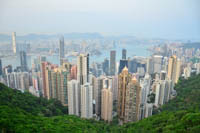Expats living in Hong Kong are generally safe and not at risk for any major health complications. But expats planning to relocate should consult their doctor beforehand and inquire if there are any recommended vaccinations or preventive medications. It is also important to ensure that all routine vaccinations and boosters are up to date. Here are some of the health risks that expats may face in Hong Kong.
Avian influenza
The influenza outbreak caused by the H5N1 virus in 1997 became a global concern due to concern over its spread to other parts of the world. Until then the virus was known to only infect birds.The outbreak was contained and most of the patients were found to be people that had close contact with infected poultry or other birds. Only a few cases occurred due to prolonged close contact with an infected person. The Hong Kong government has taken stringent safety measures to prevent the spread of the virus among humans and since 2003 there have been no avian-influenza related deaths. Although this disease is not a cause for worry, it is still advisable to avoid close contact with wild birds and to ensure that chicken is cooked thoroughly before consuming. The website of the Hong Kong Center for Health Protection provides additional information and updates on avian influenza.
Seasonal influenza
Hong Kong witnesses seasonal epidemics of flu especially between January to March and July to August. These are caused by human influenza strains and are usually mild. Much of the population also develops immunity against these viruses. There are yearly flu vaccinations that help to protect against seasonal influenza. It is possible to reduce your risk of contracting flu by getting a vaccination and also by maintaining good personal hygiene.
Insect-borne diseases
Mosquitoes are a nuisance in Hong Kong throughout the year, but more so during spring and summer. The problem subsides during cooler weather that begins in October. Apart from being an annoyance, mosquitoes may also be bearers of diseases. There have been a few cases of dengue fever, a disease that is common in Southeast Asian countries. Dengue fever is rare in Hong Kong and in the cases that have occurred, the disease was brought by people who were infected while abroad. Hong Kong has also seen a few cases of Japanese encephalitis, another mosquito-borne disease.
Expats can take some precautions to protect against mosquito bites such as wearing long-sleeved clothing when outdoors, applying insect repellent to any exposed areas of the body and installing mosquito screens on windows and doors.
Respiratory conditions
Hong Kong’s main health concern is air pollution. The pollution levels do not meet the World Health Organization’s safety standards in spite of government measures to quell the problem. Air pollution can lead to worsening of symptoms of asthma and other respiratory conditions. Older individuals, children and people with weak immunity may also be affected. It can even affect otherwise healthy individuals by causing discomforting symptoms like nasal, throat and chest irritation. One way to avoid exposure to pollution is to stay off the roads during peak traffic times.
Food and water-borne diseases
These are not a major health concern in Hong Kong. Tap water is considered safe for consumption. Milk, other dairy products, poultry, meat, seafood, fruits and vegetable are also safe to eat. However, like in other countries is it advisable to avoid eating raw or reheated foods and shellfish. The street food in Hong Kong is considered safe to consume, but it is better to ensure that the food is cooked in front of you.
Healthcare in Hong Kong
Hong Kong has medical facilities that practice top-quality medicine and most doctors are fluent in English. Both public and private hospitals have modern medical equipment and highly trained staff. Expats usually choose private hospitals to avoid waiting periods and because the service is better.
Private medical treatment comes at a higher price and expats need to ensure they have the health insurance to cover the costs. Some employment contracts may include healthcare coverage. Pharmacies can be found throughout the region. Some pharmaceutical chains are even located in shopping centers. The number to call for emergency medical services in Hong Kong is 999.

